Improving Psychological Research: Methodological Rigor & Replicability
VerifiedAdded on 2023/06/08
|8
|2652
|327
Essay
AI Summary
This essay explores the critical concepts of methodological rigor and replicability within psychological research, defining each and emphasizing their significance in ensuring the validity and reliability of research findings. It highlights the importance of methodological rigor in establishing trust in research outcomes through consistent and meticulous application of research methods. The essay also underscores the necessity of replicability, which involves obtaining consistent results across different studies using new data and methods. Furthermore, it discusses various strategies to enhance both methodological rigor and replicability, including improving statistical inference, promoting multisite collaboration, and increasing transparency through open data practices. The essay concludes by asserting that increasing methodological rigor and replicability leads to more reliable and credible psychological research, ultimately improving our understanding of human behavior.
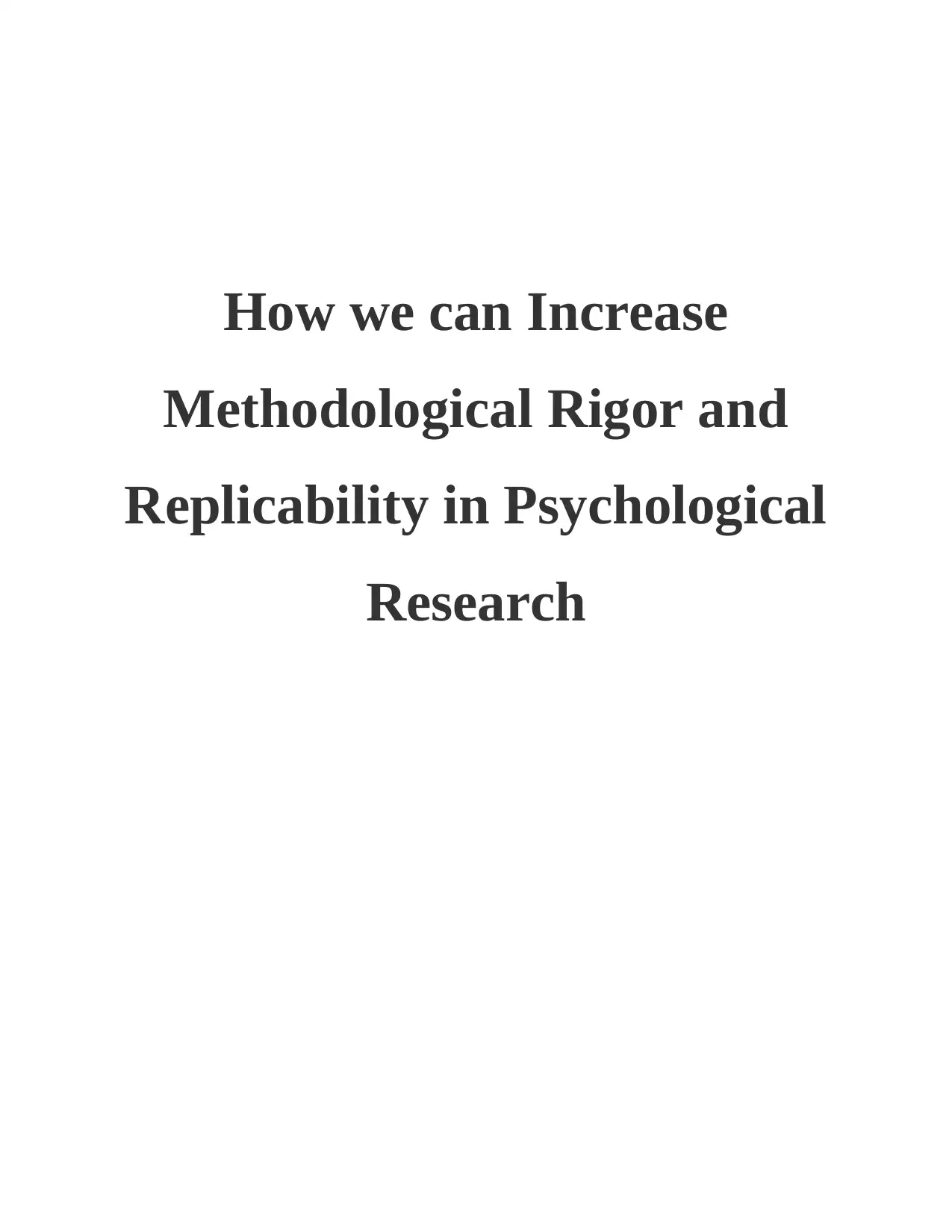
How we can Increase
Methodological Rigor and
Replicability in Psychological
Research
Methodological Rigor and
Replicability in Psychological
Research
Paraphrase This Document
Need a fresh take? Get an instant paraphrase of this document with our AI Paraphraser
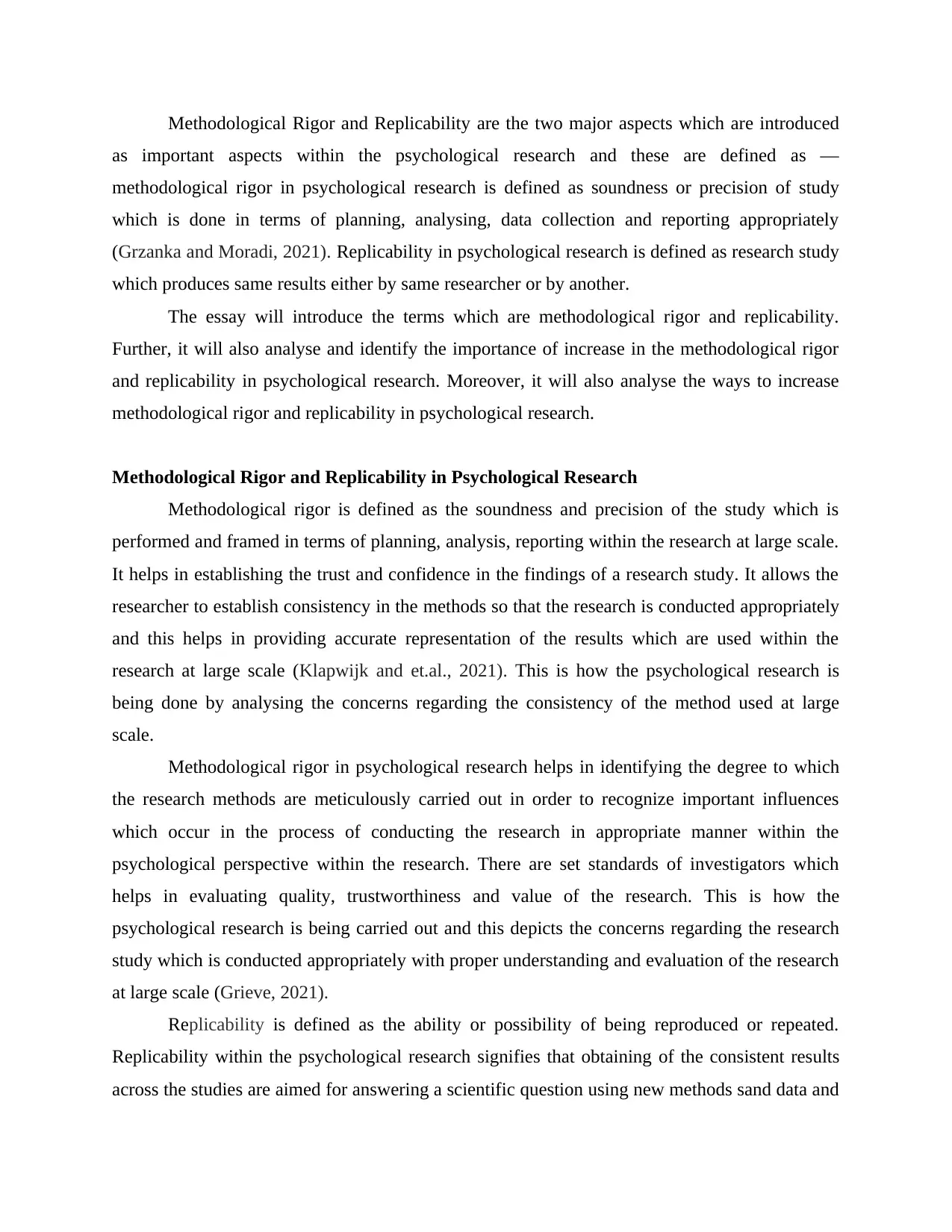
Methodological Rigor and Replicability are the two major aspects which are introduced
as important aspects within the psychological research and these are defined as —
methodological rigor in psychological research is defined as soundness or precision of study
which is done in terms of planning, analysing, data collection and reporting appropriately
(Grzanka and Moradi, 2021). Replicability in psychological research is defined as research study
which produces same results either by same researcher or by another.
The essay will introduce the terms which are methodological rigor and replicability.
Further, it will also analyse and identify the importance of increase in the methodological rigor
and replicability in psychological research. Moreover, it will also analyse the ways to increase
methodological rigor and replicability in psychological research.
Methodological Rigor and Replicability in Psychological Research
Methodological rigor is defined as the soundness and precision of the study which is
performed and framed in terms of planning, analysis, reporting within the research at large scale.
It helps in establishing the trust and confidence in the findings of a research study. It allows the
researcher to establish consistency in the methods so that the research is conducted appropriately
and this helps in providing accurate representation of the results which are used within the
research at large scale (Klapwijk and et.al., 2021). This is how the psychological research is
being done by analysing the concerns regarding the consistency of the method used at large
scale.
Methodological rigor in psychological research helps in identifying the degree to which
the research methods are meticulously carried out in order to recognize important influences
which occur in the process of conducting the research in appropriate manner within the
psychological perspective within the research. There are set standards of investigators which
helps in evaluating quality, trustworthiness and value of the research. This is how the
psychological research is being carried out and this depicts the concerns regarding the research
study which is conducted appropriately with proper understanding and evaluation of the research
at large scale (Grieve, 2021).
Replicability is defined as the ability or possibility of being reproduced or repeated.
Replicability within the psychological research signifies that obtaining of the consistent results
across the studies are aimed for answering a scientific question using new methods sand data and
as important aspects within the psychological research and these are defined as —
methodological rigor in psychological research is defined as soundness or precision of study
which is done in terms of planning, analysing, data collection and reporting appropriately
(Grzanka and Moradi, 2021). Replicability in psychological research is defined as research study
which produces same results either by same researcher or by another.
The essay will introduce the terms which are methodological rigor and replicability.
Further, it will also analyse and identify the importance of increase in the methodological rigor
and replicability in psychological research. Moreover, it will also analyse the ways to increase
methodological rigor and replicability in psychological research.
Methodological Rigor and Replicability in Psychological Research
Methodological rigor is defined as the soundness and precision of the study which is
performed and framed in terms of planning, analysis, reporting within the research at large scale.
It helps in establishing the trust and confidence in the findings of a research study. It allows the
researcher to establish consistency in the methods so that the research is conducted appropriately
and this helps in providing accurate representation of the results which are used within the
research at large scale (Klapwijk and et.al., 2021). This is how the psychological research is
being done by analysing the concerns regarding the consistency of the method used at large
scale.
Methodological rigor in psychological research helps in identifying the degree to which
the research methods are meticulously carried out in order to recognize important influences
which occur in the process of conducting the research in appropriate manner within the
psychological perspective within the research. There are set standards of investigators which
helps in evaluating quality, trustworthiness and value of the research. This is how the
psychological research is being carried out and this depicts the concerns regarding the research
study which is conducted appropriately with proper understanding and evaluation of the research
at large scale (Grieve, 2021).
Replicability is defined as the ability or possibility of being reproduced or repeated.
Replicability within the psychological research signifies that obtaining of the consistent results
across the studies are aimed for answering a scientific question using new methods sand data and
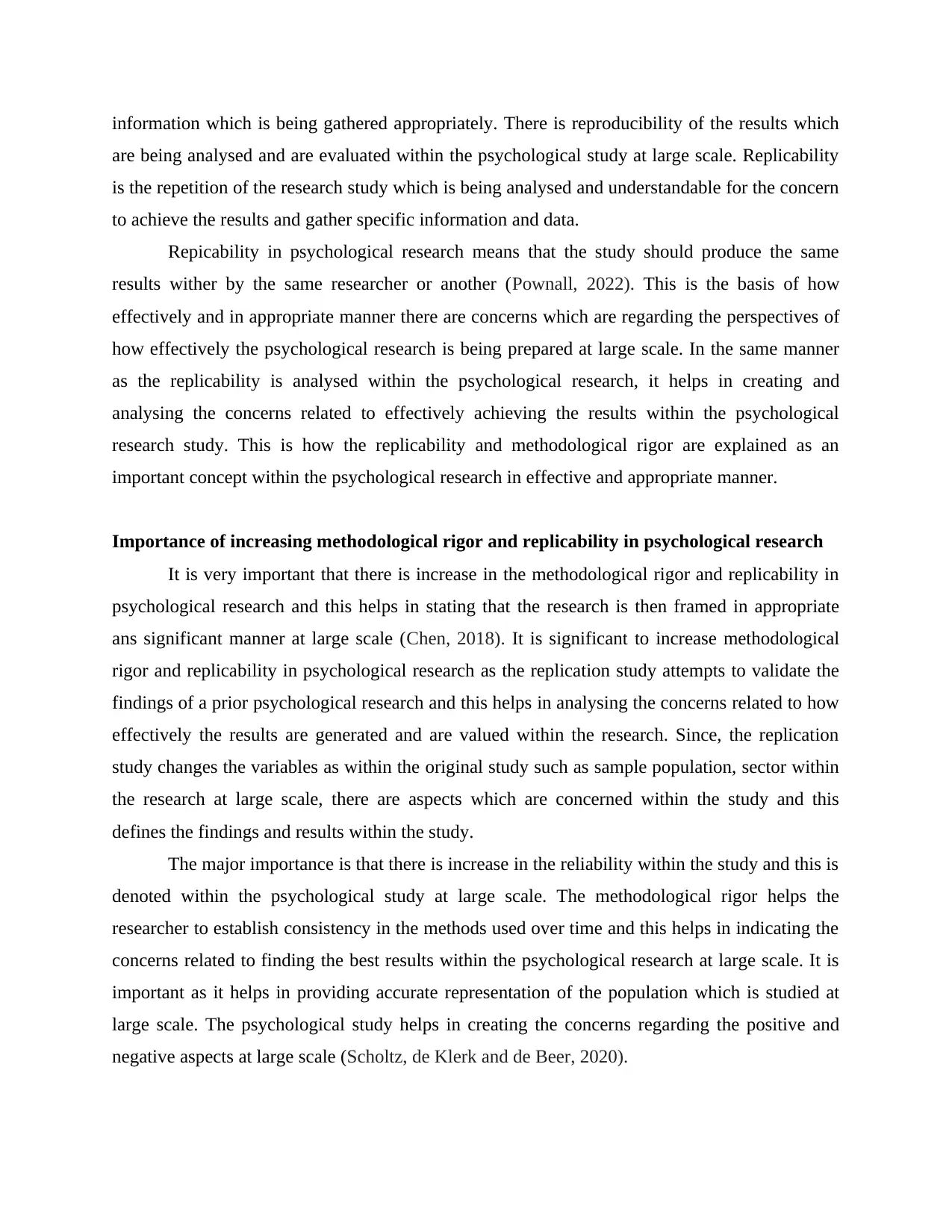
information which is being gathered appropriately. There is reproducibility of the results which
are being analysed and are evaluated within the psychological study at large scale. Replicability
is the repetition of the research study which is being analysed and understandable for the concern
to achieve the results and gather specific information and data.
Repicability in psychological research means that the study should produce the same
results wither by the same researcher or another (Pownall, 2022). This is the basis of how
effectively and in appropriate manner there are concerns which are regarding the perspectives of
how effectively the psychological research is being prepared at large scale. In the same manner
as the replicability is analysed within the psychological research, it helps in creating and
analysing the concerns related to effectively achieving the results within the psychological
research study. This is how the replicability and methodological rigor are explained as an
important concept within the psychological research in effective and appropriate manner.
Importance of increasing methodological rigor and replicability in psychological research
It is very important that there is increase in the methodological rigor and replicability in
psychological research and this helps in stating that the research is then framed in appropriate
ans significant manner at large scale (Chen, 2018). It is significant to increase methodological
rigor and replicability in psychological research as the replication study attempts to validate the
findings of a prior psychological research and this helps in analysing the concerns related to how
effectively the results are generated and are valued within the research. Since, the replication
study changes the variables as within the original study such as sample population, sector within
the research at large scale, there are aspects which are concerned within the study and this
defines the findings and results within the study.
The major importance is that there is increase in the reliability within the study and this is
denoted within the psychological study at large scale. The methodological rigor helps the
researcher to establish consistency in the methods used over time and this helps in indicating the
concerns related to finding the best results within the psychological research at large scale. It is
important as it helps in providing accurate representation of the population which is studied at
large scale. The psychological study helps in creating the concerns regarding the positive and
negative aspects at large scale (Scholtz, de Klerk and de Beer, 2020).
are being analysed and are evaluated within the psychological study at large scale. Replicability
is the repetition of the research study which is being analysed and understandable for the concern
to achieve the results and gather specific information and data.
Repicability in psychological research means that the study should produce the same
results wither by the same researcher or another (Pownall, 2022). This is the basis of how
effectively and in appropriate manner there are concerns which are regarding the perspectives of
how effectively the psychological research is being prepared at large scale. In the same manner
as the replicability is analysed within the psychological research, it helps in creating and
analysing the concerns related to effectively achieving the results within the psychological
research study. This is how the replicability and methodological rigor are explained as an
important concept within the psychological research in effective and appropriate manner.
Importance of increasing methodological rigor and replicability in psychological research
It is very important that there is increase in the methodological rigor and replicability in
psychological research and this helps in stating that the research is then framed in appropriate
ans significant manner at large scale (Chen, 2018). It is significant to increase methodological
rigor and replicability in psychological research as the replication study attempts to validate the
findings of a prior psychological research and this helps in analysing the concerns related to how
effectively the results are generated and are valued within the research. Since, the replication
study changes the variables as within the original study such as sample population, sector within
the research at large scale, there are aspects which are concerned within the study and this
defines the findings and results within the study.
The major importance is that there is increase in the reliability within the study and this is
denoted within the psychological study at large scale. The methodological rigor helps the
researcher to establish consistency in the methods used over time and this helps in indicating the
concerns related to finding the best results within the psychological research at large scale. It is
important as it helps in providing accurate representation of the population which is studied at
large scale. The psychological study helps in creating the concerns regarding the positive and
negative aspects at large scale (Scholtz, de Klerk and de Beer, 2020).
⊘ This is a preview!⊘
Do you want full access?
Subscribe today to unlock all pages.

Trusted by 1+ million students worldwide
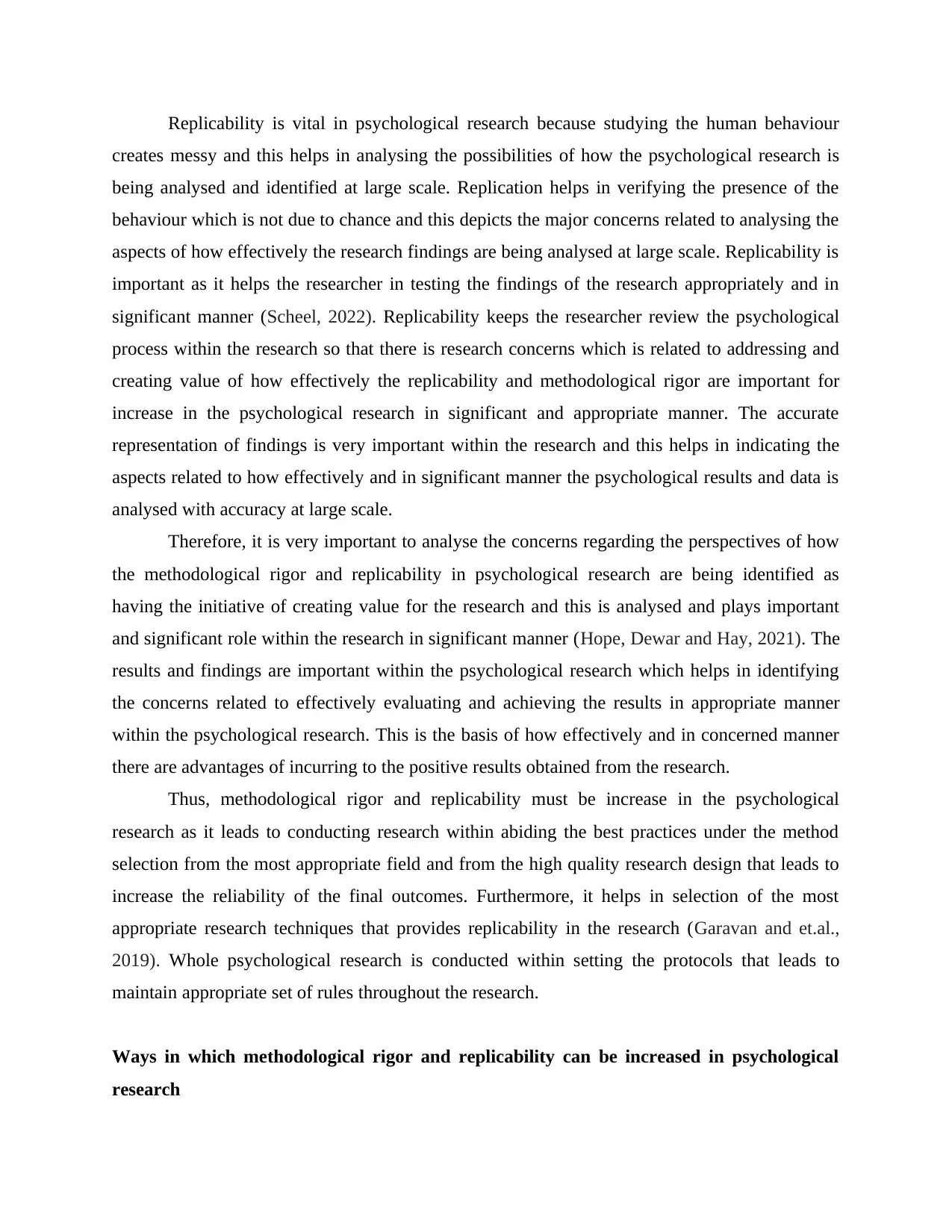
Replicability is vital in psychological research because studying the human behaviour
creates messy and this helps in analysing the possibilities of how the psychological research is
being analysed and identified at large scale. Replication helps in verifying the presence of the
behaviour which is not due to chance and this depicts the major concerns related to analysing the
aspects of how effectively the research findings are being analysed at large scale. Replicability is
important as it helps the researcher in testing the findings of the research appropriately and in
significant manner (Scheel, 2022). Replicability keeps the researcher review the psychological
process within the research so that there is research concerns which is related to addressing and
creating value of how effectively the replicability and methodological rigor are important for
increase in the psychological research in significant and appropriate manner. The accurate
representation of findings is very important within the research and this helps in indicating the
aspects related to how effectively and in significant manner the psychological results and data is
analysed with accuracy at large scale.
Therefore, it is very important to analyse the concerns regarding the perspectives of how
the methodological rigor and replicability in psychological research are being identified as
having the initiative of creating value for the research and this is analysed and plays important
and significant role within the research in significant manner (Hope, Dewar and Hay, 2021). The
results and findings are important within the psychological research which helps in identifying
the concerns related to effectively evaluating and achieving the results in appropriate manner
within the psychological research. This is the basis of how effectively and in concerned manner
there are advantages of incurring to the positive results obtained from the research.
Thus, methodological rigor and replicability must be increase in the psychological
research as it leads to conducting research within abiding the best practices under the method
selection from the most appropriate field and from the high quality research design that leads to
increase the reliability of the final outcomes. Furthermore, it helps in selection of the most
appropriate research techniques that provides replicability in the research (Garavan and et.al.,
2019). Whole psychological research is conducted within setting the protocols that leads to
maintain appropriate set of rules throughout the research.
Ways in which methodological rigor and replicability can be increased in psychological
research
creates messy and this helps in analysing the possibilities of how the psychological research is
being analysed and identified at large scale. Replication helps in verifying the presence of the
behaviour which is not due to chance and this depicts the major concerns related to analysing the
aspects of how effectively the research findings are being analysed at large scale. Replicability is
important as it helps the researcher in testing the findings of the research appropriately and in
significant manner (Scheel, 2022). Replicability keeps the researcher review the psychological
process within the research so that there is research concerns which is related to addressing and
creating value of how effectively the replicability and methodological rigor are important for
increase in the psychological research in significant and appropriate manner. The accurate
representation of findings is very important within the research and this helps in indicating the
aspects related to how effectively and in significant manner the psychological results and data is
analysed with accuracy at large scale.
Therefore, it is very important to analyse the concerns regarding the perspectives of how
the methodological rigor and replicability in psychological research are being identified as
having the initiative of creating value for the research and this is analysed and plays important
and significant role within the research in significant manner (Hope, Dewar and Hay, 2021). The
results and findings are important within the psychological research which helps in identifying
the concerns related to effectively evaluating and achieving the results in appropriate manner
within the psychological research. This is the basis of how effectively and in concerned manner
there are advantages of incurring to the positive results obtained from the research.
Thus, methodological rigor and replicability must be increase in the psychological
research as it leads to conducting research within abiding the best practices under the method
selection from the most appropriate field and from the high quality research design that leads to
increase the reliability of the final outcomes. Furthermore, it helps in selection of the most
appropriate research techniques that provides replicability in the research (Garavan and et.al.,
2019). Whole psychological research is conducted within setting the protocols that leads to
maintain appropriate set of rules throughout the research.
Ways in which methodological rigor and replicability can be increased in psychological
research
Paraphrase This Document
Need a fresh take? Get an instant paraphrase of this document with our AI Paraphraser
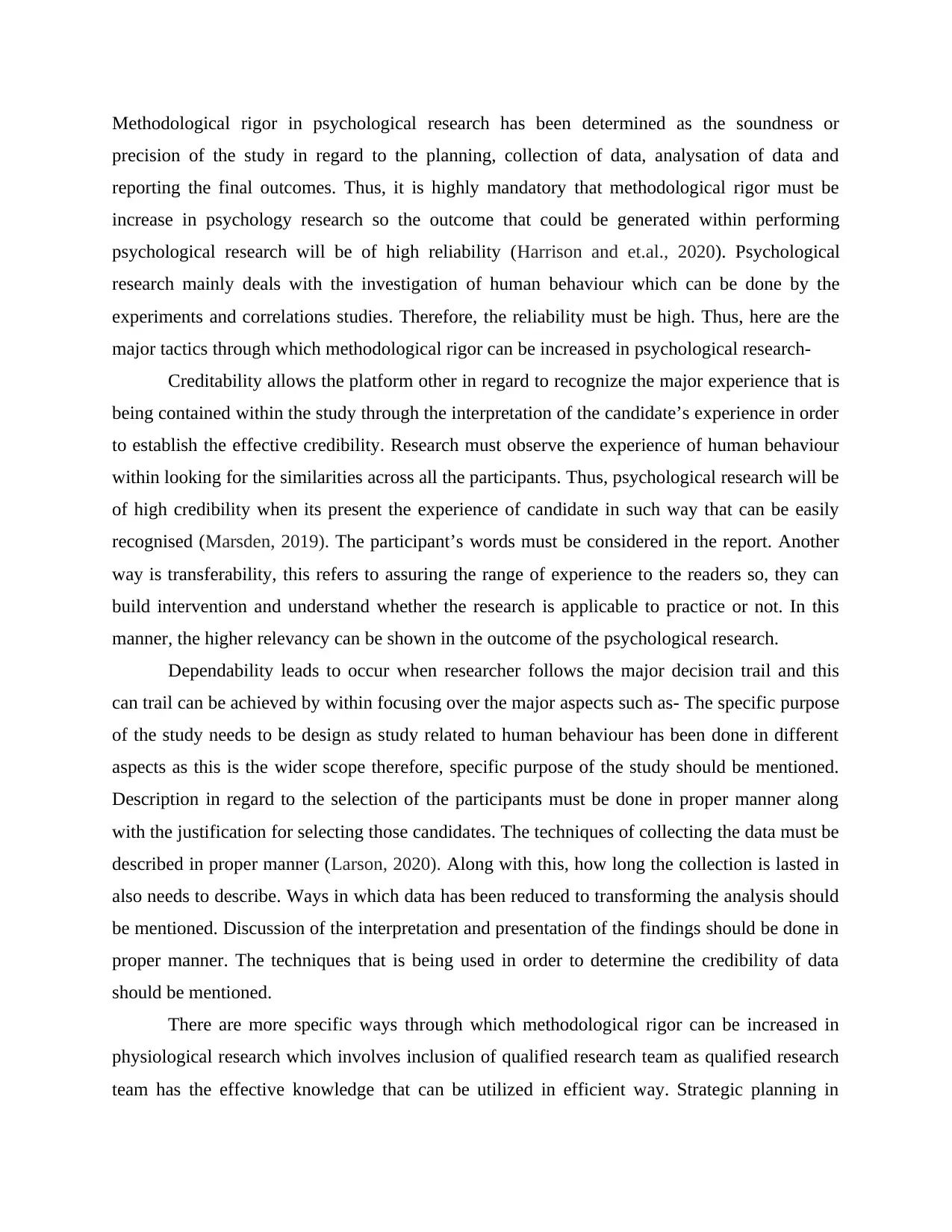
Methodological rigor in psychological research has been determined as the soundness or
precision of the study in regard to the planning, collection of data, analysation of data and
reporting the final outcomes. Thus, it is highly mandatory that methodological rigor must be
increase in psychology research so the outcome that could be generated within performing
psychological research will be of high reliability (Harrison and et.al., 2020). Psychological
research mainly deals with the investigation of human behaviour which can be done by the
experiments and correlations studies. Therefore, the reliability must be high. Thus, here are the
major tactics through which methodological rigor can be increased in psychological research-
Creditability allows the platform other in regard to recognize the major experience that is
being contained within the study through the interpretation of the candidate’s experience in order
to establish the effective credibility. Research must observe the experience of human behaviour
within looking for the similarities across all the participants. Thus, psychological research will be
of high credibility when its present the experience of candidate in such way that can be easily
recognised (Marsden, 2019). The participant’s words must be considered in the report. Another
way is transferability, this refers to assuring the range of experience to the readers so, they can
build intervention and understand whether the research is applicable to practice or not. In this
manner, the higher relevancy can be shown in the outcome of the psychological research.
Dependability leads to occur when researcher follows the major decision trail and this
can trail can be achieved by within focusing over the major aspects such as- The specific purpose
of the study needs to be design as study related to human behaviour has been done in different
aspects as this is the wider scope therefore, specific purpose of the study should be mentioned.
Description in regard to the selection of the participants must be done in proper manner along
with the justification for selecting those candidates. The techniques of collecting the data must be
described in proper manner (Larson, 2020). Along with this, how long the collection is lasted in
also needs to describe. Ways in which data has been reduced to transforming the analysis should
be mentioned. Discussion of the interpretation and presentation of the findings should be done in
proper manner. The techniques that is being used in order to determine the credibility of data
should be mentioned.
There are more specific ways through which methodological rigor can be increased in
physiological research which involves inclusion of qualified research team as qualified research
team has the effective knowledge that can be utilized in efficient way. Strategic planning in
precision of the study in regard to the planning, collection of data, analysation of data and
reporting the final outcomes. Thus, it is highly mandatory that methodological rigor must be
increase in psychology research so the outcome that could be generated within performing
psychological research will be of high reliability (Harrison and et.al., 2020). Psychological
research mainly deals with the investigation of human behaviour which can be done by the
experiments and correlations studies. Therefore, the reliability must be high. Thus, here are the
major tactics through which methodological rigor can be increased in psychological research-
Creditability allows the platform other in regard to recognize the major experience that is
being contained within the study through the interpretation of the candidate’s experience in order
to establish the effective credibility. Research must observe the experience of human behaviour
within looking for the similarities across all the participants. Thus, psychological research will be
of high credibility when its present the experience of candidate in such way that can be easily
recognised (Marsden, 2019). The participant’s words must be considered in the report. Another
way is transferability, this refers to assuring the range of experience to the readers so, they can
build intervention and understand whether the research is applicable to practice or not. In this
manner, the higher relevancy can be shown in the outcome of the psychological research.
Dependability leads to occur when researcher follows the major decision trail and this
can trail can be achieved by within focusing over the major aspects such as- The specific purpose
of the study needs to be design as study related to human behaviour has been done in different
aspects as this is the wider scope therefore, specific purpose of the study should be mentioned.
Description in regard to the selection of the participants must be done in proper manner along
with the justification for selecting those candidates. The techniques of collecting the data must be
described in proper manner (Larson, 2020). Along with this, how long the collection is lasted in
also needs to describe. Ways in which data has been reduced to transforming the analysis should
be mentioned. Discussion of the interpretation and presentation of the findings should be done in
proper manner. The techniques that is being used in order to determine the credibility of data
should be mentioned.
There are more specific ways through which methodological rigor can be increased in
physiological research which involves inclusion of qualified research team as qualified research
team has the effective knowledge that can be utilized in efficient way. Strategic planning in
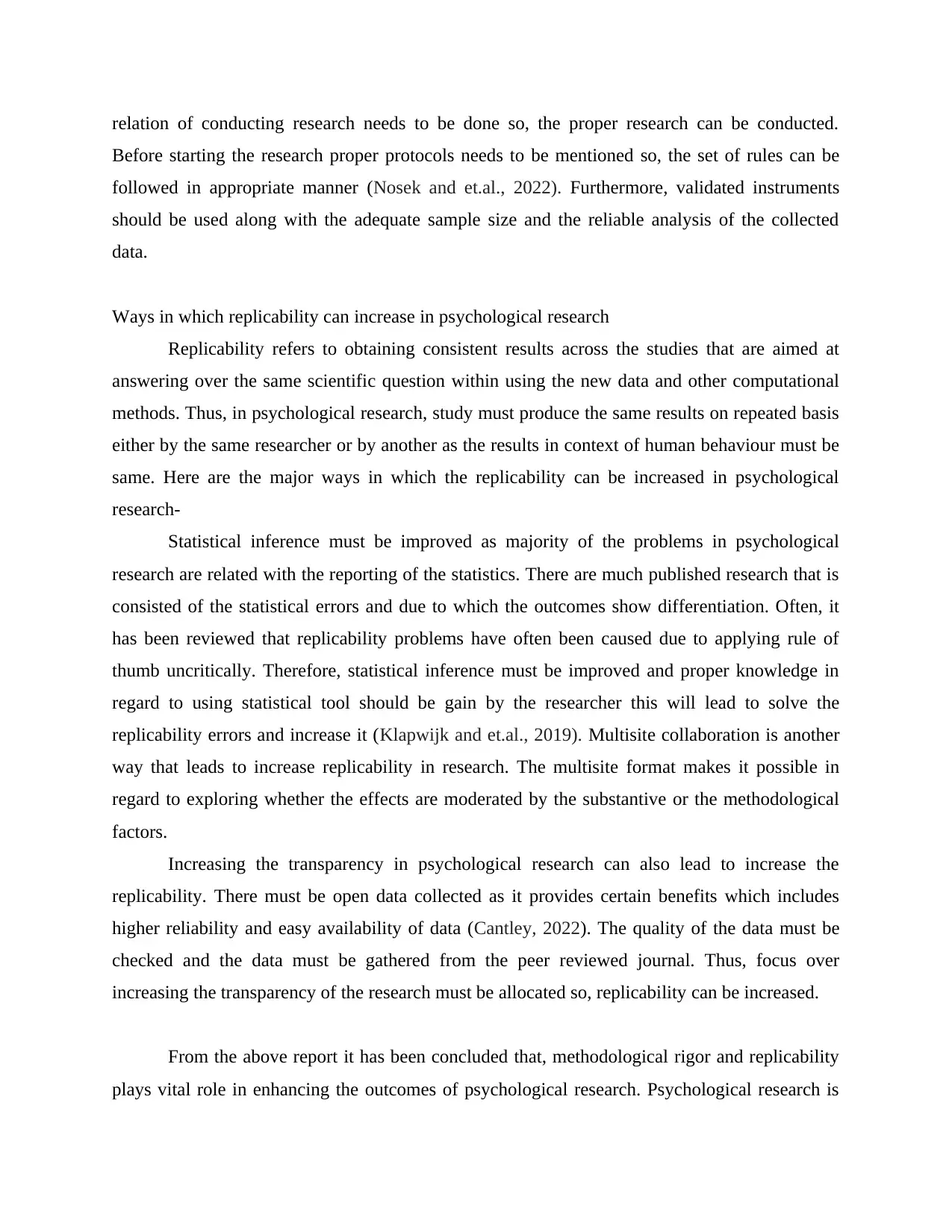
relation of conducting research needs to be done so, the proper research can be conducted.
Before starting the research proper protocols needs to be mentioned so, the set of rules can be
followed in appropriate manner (Nosek and et.al., 2022). Furthermore, validated instruments
should be used along with the adequate sample size and the reliable analysis of the collected
data.
Ways in which replicability can increase in psychological research
Replicability refers to obtaining consistent results across the studies that are aimed at
answering over the same scientific question within using the new data and other computational
methods. Thus, in psychological research, study must produce the same results on repeated basis
either by the same researcher or by another as the results in context of human behaviour must be
same. Here are the major ways in which the replicability can be increased in psychological
research-
Statistical inference must be improved as majority of the problems in psychological
research are related with the reporting of the statistics. There are much published research that is
consisted of the statistical errors and due to which the outcomes show differentiation. Often, it
has been reviewed that replicability problems have often been caused due to applying rule of
thumb uncritically. Therefore, statistical inference must be improved and proper knowledge in
regard to using statistical tool should be gain by the researcher this will lead to solve the
replicability errors and increase it (Klapwijk and et.al., 2019). Multisite collaboration is another
way that leads to increase replicability in research. The multisite format makes it possible in
regard to exploring whether the effects are moderated by the substantive or the methodological
factors.
Increasing the transparency in psychological research can also lead to increase the
replicability. There must be open data collected as it provides certain benefits which includes
higher reliability and easy availability of data (Cantley, 2022). The quality of the data must be
checked and the data must be gathered from the peer reviewed journal. Thus, focus over
increasing the transparency of the research must be allocated so, replicability can be increased.
From the above report it has been concluded that, methodological rigor and replicability
plays vital role in enhancing the outcomes of psychological research. Psychological research is
Before starting the research proper protocols needs to be mentioned so, the set of rules can be
followed in appropriate manner (Nosek and et.al., 2022). Furthermore, validated instruments
should be used along with the adequate sample size and the reliable analysis of the collected
data.
Ways in which replicability can increase in psychological research
Replicability refers to obtaining consistent results across the studies that are aimed at
answering over the same scientific question within using the new data and other computational
methods. Thus, in psychological research, study must produce the same results on repeated basis
either by the same researcher or by another as the results in context of human behaviour must be
same. Here are the major ways in which the replicability can be increased in psychological
research-
Statistical inference must be improved as majority of the problems in psychological
research are related with the reporting of the statistics. There are much published research that is
consisted of the statistical errors and due to which the outcomes show differentiation. Often, it
has been reviewed that replicability problems have often been caused due to applying rule of
thumb uncritically. Therefore, statistical inference must be improved and proper knowledge in
regard to using statistical tool should be gain by the researcher this will lead to solve the
replicability errors and increase it (Klapwijk and et.al., 2019). Multisite collaboration is another
way that leads to increase replicability in research. The multisite format makes it possible in
regard to exploring whether the effects are moderated by the substantive or the methodological
factors.
Increasing the transparency in psychological research can also lead to increase the
replicability. There must be open data collected as it provides certain benefits which includes
higher reliability and easy availability of data (Cantley, 2022). The quality of the data must be
checked and the data must be gathered from the peer reviewed journal. Thus, focus over
increasing the transparency of the research must be allocated so, replicability can be increased.
From the above report it has been concluded that, methodological rigor and replicability
plays vital role in enhancing the outcomes of psychological research. Psychological research is
⊘ This is a preview!⊘
Do you want full access?
Subscribe today to unlock all pages.

Trusted by 1+ million students worldwide
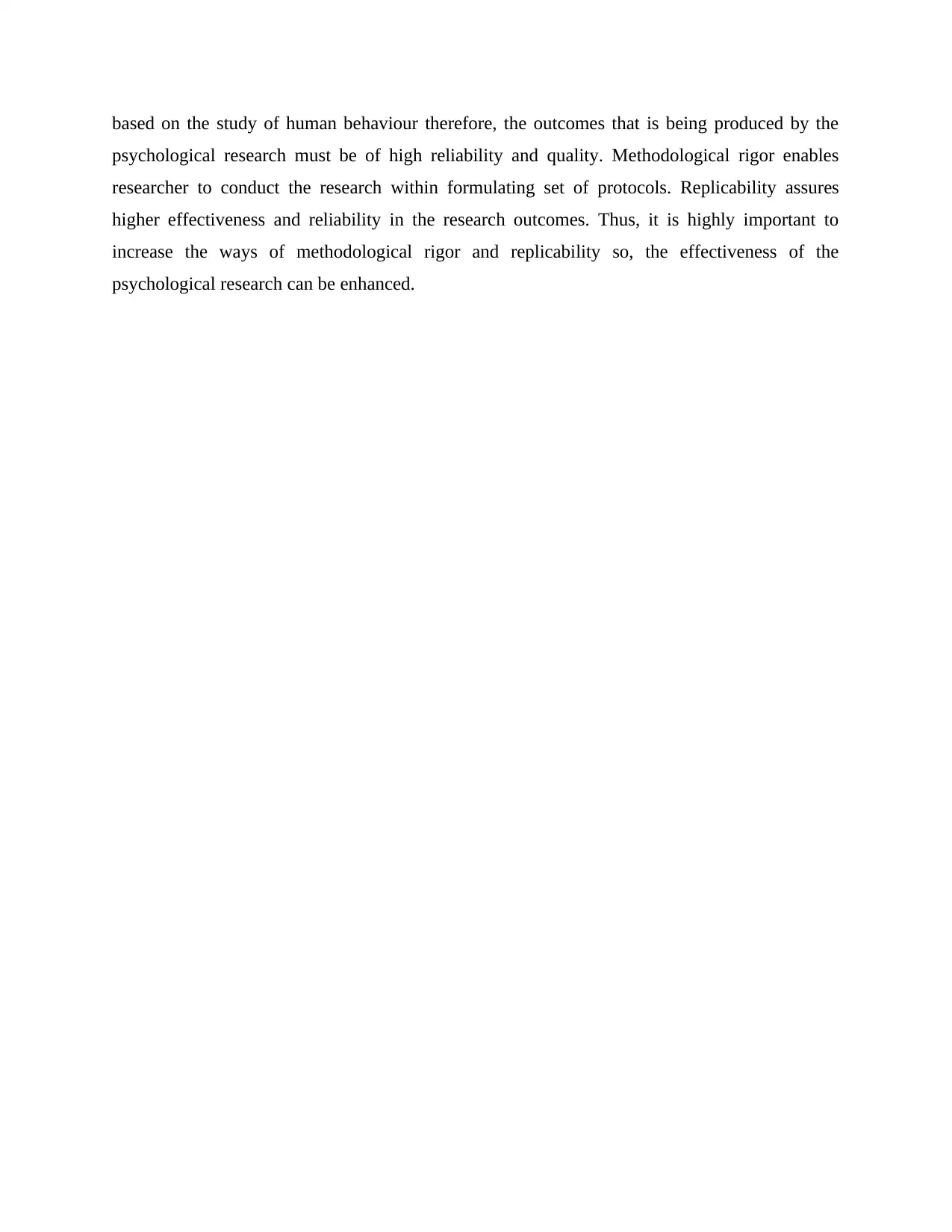
based on the study of human behaviour therefore, the outcomes that is being produced by the
psychological research must be of high reliability and quality. Methodological rigor enables
researcher to conduct the research within formulating set of protocols. Replicability assures
higher effectiveness and reliability in the research outcomes. Thus, it is highly important to
increase the ways of methodological rigor and replicability so, the effectiveness of the
psychological research can be enhanced.
psychological research must be of high reliability and quality. Methodological rigor enables
researcher to conduct the research within formulating set of protocols. Replicability assures
higher effectiveness and reliability in the research outcomes. Thus, it is highly important to
increase the ways of methodological rigor and replicability so, the effectiveness of the
psychological research can be enhanced.
Paraphrase This Document
Need a fresh take? Get an instant paraphrase of this document with our AI Paraphraser
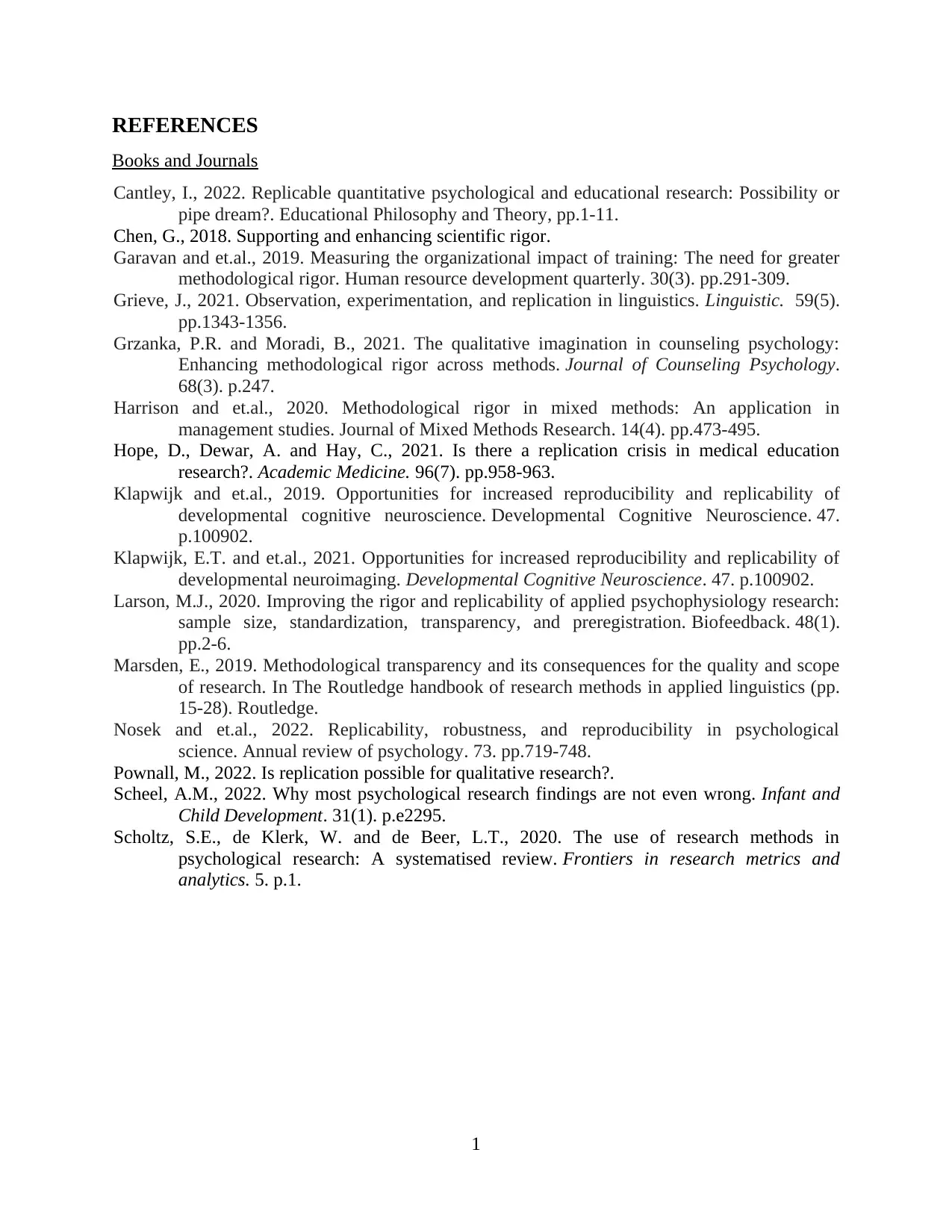
REFERENCES
Books and Journals
Cantley, I., 2022. Replicable quantitative psychological and educational research: Possibility or
pipe dream?. Educational Philosophy and Theory, pp.1-11.
Chen, G., 2018. Supporting and enhancing scientific rigor.
Garavan and et.al., 2019. Measuring the organizational impact of training: The need for greater
methodological rigor. Human resource development quarterly. 30(3). pp.291-309.
Grieve, J., 2021. Observation, experimentation, and replication in linguistics. Linguistic. 59(5).
pp.1343-1356.
Grzanka, P.R. and Moradi, B., 2021. The qualitative imagination in counseling psychology:
Enhancing methodological rigor across methods. Journal of Counseling Psychology.
68(3). p.247.
Harrison and et.al., 2020. Methodological rigor in mixed methods: An application in
management studies. Journal of Mixed Methods Research. 14(4). pp.473-495.
Hope, D., Dewar, A. and Hay, C., 2021. Is there a replication crisis in medical education
research?. Academic Medicine. 96(7). pp.958-963.
Klapwijk and et.al., 2019. Opportunities for increased reproducibility and replicability of
developmental cognitive neuroscience. Developmental Cognitive Neuroscience. 47.
p.100902.
Klapwijk, E.T. and et.al., 2021. Opportunities for increased reproducibility and replicability of
developmental neuroimaging. Developmental Cognitive Neuroscience. 47. p.100902.
Larson, M.J., 2020. Improving the rigor and replicability of applied psychophysiology research:
sample size, standardization, transparency, and preregistration. Biofeedback. 48(1).
pp.2-6.
Marsden, E., 2019. Methodological transparency and its consequences for the quality and scope
of research. In The Routledge handbook of research methods in applied linguistics (pp.
15-28). Routledge.
Nosek and et.al., 2022. Replicability, robustness, and reproducibility in psychological
science. Annual review of psychology. 73. pp.719-748.
Pownall, M., 2022. Is replication possible for qualitative research?.
Scheel, A.M., 2022. Why most psychological research findings are not even wrong. Infant and
Child Development. 31(1). p.e2295.
Scholtz, S.E., de Klerk, W. and de Beer, L.T., 2020. The use of research methods in
psychological research: A systematised review. Frontiers in research metrics and
analytics. 5. p.1.
1
Books and Journals
Cantley, I., 2022. Replicable quantitative psychological and educational research: Possibility or
pipe dream?. Educational Philosophy and Theory, pp.1-11.
Chen, G., 2018. Supporting and enhancing scientific rigor.
Garavan and et.al., 2019. Measuring the organizational impact of training: The need for greater
methodological rigor. Human resource development quarterly. 30(3). pp.291-309.
Grieve, J., 2021. Observation, experimentation, and replication in linguistics. Linguistic. 59(5).
pp.1343-1356.
Grzanka, P.R. and Moradi, B., 2021. The qualitative imagination in counseling psychology:
Enhancing methodological rigor across methods. Journal of Counseling Psychology.
68(3). p.247.
Harrison and et.al., 2020. Methodological rigor in mixed methods: An application in
management studies. Journal of Mixed Methods Research. 14(4). pp.473-495.
Hope, D., Dewar, A. and Hay, C., 2021. Is there a replication crisis in medical education
research?. Academic Medicine. 96(7). pp.958-963.
Klapwijk and et.al., 2019. Opportunities for increased reproducibility and replicability of
developmental cognitive neuroscience. Developmental Cognitive Neuroscience. 47.
p.100902.
Klapwijk, E.T. and et.al., 2021. Opportunities for increased reproducibility and replicability of
developmental neuroimaging. Developmental Cognitive Neuroscience. 47. p.100902.
Larson, M.J., 2020. Improving the rigor and replicability of applied psychophysiology research:
sample size, standardization, transparency, and preregistration. Biofeedback. 48(1).
pp.2-6.
Marsden, E., 2019. Methodological transparency and its consequences for the quality and scope
of research. In The Routledge handbook of research methods in applied linguistics (pp.
15-28). Routledge.
Nosek and et.al., 2022. Replicability, robustness, and reproducibility in psychological
science. Annual review of psychology. 73. pp.719-748.
Pownall, M., 2022. Is replication possible for qualitative research?.
Scheel, A.M., 2022. Why most psychological research findings are not even wrong. Infant and
Child Development. 31(1). p.e2295.
Scholtz, S.E., de Klerk, W. and de Beer, L.T., 2020. The use of research methods in
psychological research: A systematised review. Frontiers in research metrics and
analytics. 5. p.1.
1
1 out of 8
Related Documents
Your All-in-One AI-Powered Toolkit for Academic Success.
+13062052269
info@desklib.com
Available 24*7 on WhatsApp / Email
![[object Object]](/_next/static/media/star-bottom.7253800d.svg)
Unlock your academic potential
Copyright © 2020–2026 A2Z Services. All Rights Reserved. Developed and managed by ZUCOL.





